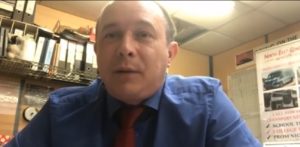Ministers hear coach plight evidence
Despite some of the direst warnings yet, Baroness Vere makes no pledge to help the coach sector
At the coach evidence session for the Transport Select Committee, chaired by Huw Merriman, MPs were told that as many as 40% of coach operators could become insolvent when repayment of CBILS loans begin in June.
Three coach operators and Graham Vidler, Chief Executive of the Confederation of Passenger Transport, set out in black and white the plight of the industry, explaining the source and size of their current debt, the social importance of coaching and their very real fears for family-run businesses. But in the final session, involving transport minister Baroness Vere and tourism minister Nigel Huddleston, it was clear that there are no plans for a bail-out.
Graham Vidler was the first to give evidence, explaining how coaches are vital for a section of the public, affordable, accessible and environmentally-friendly: “In 2019, at least nine million people made a trip by coach, including two million who went on holiday and 3.5 million day trips. 60,000 children went to school by coach. There were 23 million visits to tourist attractions by coach,” said Graham.
He said that’s only part of the story: “Coaches offer door-to-door travel for people who wouldn’t otherwise be able to go on holiday. Also, coaches step in when flights and rail need them. The coach plays a huge role both economically and socially.”
Candice Mason, Director of Business at Masons Minibus and Coach Hire, said the effect of the pandemic and its three lockdowns on Masons had been crippling: “We have been devastated. 50% of our business is with the local community. We do work with MIND, Mencap and Age UK, the Scouts and run a lot of educational visits.
“About 30% of our work is home-to-school, but this isn’t for local authorities but is for private schools, so commercial business. 15% of our work is day trips and holidays. 18 March 202 we had our last hire booking. Our losses stand currently at over £1 million.”
Candice explained that the grants, while welcome, have not been sufficient: “We accessed £10,000 grant from our local authority and then got a further £4,500. We have a £225,000 CBILS loan but we have to start repaying it in June.”
Mick Pearson, Transport Manager of TM Travel, said the story was much the same for his company: “We have a small amount of grant money but, no long ago, we invested in three Euro VI coaches because we are being urged to go ‘green.’ Our finance alone costs £20,000 per month. The loans and grants have barely scratched the surface.
“There is no clear outline of the future for our sector to get back on track. It’s been the same all he way through. Every time we tried to get going, another lockdown came.”
The danger is, those who haven’t invested are in the strongest position; the forward thinkers are the worst affected – Nigel Skill
Nigel Skill, Managing Director of Skills Holidays, painted a similar picture: “Our losses are estimated at £3.2 million, and a lot of that is down to the fact that we embraced the government’s advice and have invested in green technology. £19 million has been invested in Euro VI vehicles.
“There has been talk about ‘the survival of the fittest’; as things stand, the most vulnerable operators are those who invested as we were told. Operating coaches is a complex business. We have spent £500,000 on workshop facilities. The danger is, those who haven’t invested are in the strongest position; the forward thinkers are the worst affected.”
Asked to quantify the downturn, Candice Mason said that, of their 19 vehicles, only the school buses have moved since last March: “Between April and December of 2019, pre-Covid, we carried 70,000 passengers. In the same period last year, we carried a thousand.”
Nigel Skill said that, at peak, Skills has had 40 vehicles on school runs out of 100 available coaches, but that wasn’t enough: “Our school vehicle profits are predicated on infill work between the two runs. Frankly, running them has been a double whammy, because we’re almost losing money.”
Mick Pearson said that of the TM Travel fleet, an eighth has had any work: “The most expensive vehicles in our fleet haven’t turned a wheel since March 2020.”
Asked what support he has had, Mick said: “The grants were related to rateable value and, as we share a yard, it was split with another operator. But it wasn’t easy getting that; at first, we were turned down by the local authority, which said we aren’t part of the leisure industry. We then went to the bank for the promised CBILS loan, and sought £1.3 million. We were turned down. Eventually, they agreed to £50,000 but against £20,000 in finance payments, we can’t stand on our own two feet.”
Nigel Skill said the furlough support had been welcome but the cost of getting CBILS loans had been prohibitive, despite Nigel’s brother being a qualified accountant: “We put together a claim for £2.5 million but to get it, we had to get PWC to audit us, and that cost us £15,000. Having been recommended by them for the £2.5m, the bank then decided to give us only £2 million.
“To get the other £500,000, we had to have another £15,000 audit, so we did that, and got the additional CBILS loan. Then PWC upped the bill for the audit. The CBILS loan eventually cost us £50,000… just to apply for it.”
Graham Vidler said the Scottish scheme which saw staggered grants which depended on vehicle age was far more fit for purpose: “It is a well-designed scheme, offering £12,000 per vehicle then tapers down. We have calculated that applying a similar scheme to Scotland’s in England and Wales would cost between £100 million and £150 million.
Chair of the committee, Huw Merriman, asked Candice Mason for her experience of obtaining home-to-school grants from her local authority: “We were laughed at by the council, in effect,” she said. “I hear that around 1,000 operators got local authority grants.”
Some local authorities decided it was not money for coach operators. I’d like to quantify that, but local authorities haven’t answered our questions about where that money went. We think about 20% of it went to coach operators – Graham Vidler
Mick Pearson said the money given by central government for schools mostly went to bus operators such as Go North East: “They have used it to buy new buses and coaches, and have now started a coach division going after the work we would have had.”
Nigel Skill said it was a similar pattern elsewhere, with any available money coming to him via contracts made with FirstBus.
Graham Vidler agreed that had been a feature: “The funding for home-to-school was given to local authorities and then they made a decision as to where it would go. Some decided it was not money for coach operators. I’d like to quantify that, but local authorities haven’t answered our questions about where that money went. We think about 20% of it went to coach operators.”
To move forward, said Nigel Skill, the industry needs a clear roadmap: “Our bookings for tours have been extremely brisk. This is the main plank for our recovery. If there is a clear roadmap out of the lockdown, this would be the most important help for us. At the moment, he only certainty for us is paying back more finance.”
Mick Pearson said that, since the first lockdown, TM Travel has gone from bounce-back to pay back, with booking deposits refunded more than once. Witnesses were asked what would be the most helpful thing the government could provide.
“Anything at all would be helpful” said Graham Vidler. “Some kind of ‘eat out to help out’ would help but fundamentally, it is clarity and consistency around the roadmap out of this. During its peak months of June to August, the coach industry wants to serve its customers. And coaches need to operate at full capacity. We need a social distancing review.”
The meeting heard that some attractions have interpreted the guidance differently and possibly incorrectly, and banned group bookings: “It arose last summer and it’s happening again; tourist attractions cannot take bookings until there is a review of the guidance.”
What we want is someone to stand up and say that coach travel is safe and green. I saw the miles of cars going into the Lake District last summer and thought ‘coaches could have solved that problem – Candice Mason
Candice Mason said that finding group venues has become very difficult: “The vast majority of our customers come with us because they can’t drive. Some have not left their homes since last March. We always try to pick our venues carefully. Most of the smaller venues have been happy to have the conversation but the bigger venues are not even engaging with us.
“I booked hotels last year which have since increased their prices to me. Some don’t even have group rates.” Candice said that a VAT reduction wouldn’t help her business much: “What we want is someone to stand up and say that coach travel is safe and green. I saw the miles of cars going into the Lake District last summer and thought ‘coaches could have solved that problem.’”
Mick Pearson agreed that the industry simply needs its work back, and Nigel Skill added: “We need to have a positive message about coach travel. The trade has now seen us as high risk. That has to be overcome.”
Former Transport Select Committee Chair Lillian Greenwood asked for information about the importance of coaches to communities. Nigel Skill said his tour staff had been calling customers and found that, for some, this was the only call they’d had for a long time. Candice Mason said Masons offered customers transport to their vaccination centre if they needed it.
“These are relationships built over a long period which can’t just be filled in a void because they’re relationships built on trust,” said Lillian. “Yes, our customers are part of our family,” said Candice. Graham Vidler said as many as 40% of operators could be at risk: “These companies could collapse and we will lose businesses which are deeply embedded in their communities.
“These services are door-to-door, and vital to the young, those with disabilities and the elderly. Maybe those areas will get more coaches, but we will have lost the positive social effects.”
SNP Shadow Secretary of State for Transport, Gavin Newlands, asked Graham what effect an increase in coach use would have on emissions: “If we got a 15% upturn in ridership, we will take 47 million car journeys off the road. Coaches have a role in decarbonisation but we have to do much more to persuade a small number of people to leave their cars at home for a small number of journeys.”
Although Baroness Vere expressed great sympathy for the coach industry, she said the government had to decide which areas to support and decided transport of essential workers was a priority. Nigel Huddleston said the tourism industry, alongside group travel, had been hit particularly hard because both depended on socialising.
Told that many coach operators had failed in applying for the Retail, Hospitality and Leisure Grant Fund Nigel Huddleston said: “I am disappointed that the grants have not been distributed in the way we would have liked.” He said that since the grant began, the government has since specifically mention the coach industry and said that local authorities should now be distributing them.
“What I have heard does alarm me that these have not been available, but I could not have been clearer. Coach businesses should be getting these grants.”
Lillian Greenwood then addressed Baroness Vere: “You say you can’t save every business, but this is 40% of an entire industry. What assessment have you made of the impact on the industry?”
Baroness Vere then said that just because some coach operators fail doesn’t mean that there will be no coaches, as other businesses will come to fill the gaps. However, Lillian Greenwood asked again: “Have you made any assessment? Of course over time coaches will come back but it’s hard to see how they will replace services for whom vulnerable users have established a relationship. What assessment have you done?”
Baroness Vere admitted that no assessment had been done, but added: “I’m not sure it’s a problem which has been evidenced.” Baroness Vere said coach services are “very important but not essential…”
Greg Smith MP also cross-questioned Baroness Vere, and said: “The debt gearing many operators have is because of things the state has asked them to do such as upgrade to Euro VI coaches and convert to PSVAR. This has left coach operators in considerable debt. Do you accept there’s a unique circumstance? And is it not the case that the strongest going in will be the strongest coming out? The strongest are those who invested.”
“I was thinking of those with the greatest balance sheet headroom,” said Baroness Vere. She added: “PSVAR was mandated 20 years ago but for some reason, some took heed and some did not.”
Is the coach industry likely to be treated the same as the airline industry, where there is no social distancing? ‘No. They will be treated the same as buses.’ – Baroness Vere
“These are not challenges other businesses had to face. The high debt is because of these factors. Can the DfT not recognise that USP to get something more?”
Baroness Vere said that the Euro VI issue would be covered naturally with the coach replacement cycle.
Greg Smith asked Nigel Huddleston is coaches could be actively promoted during the recovery by his department: “That’s fair comment,” said Huddleston. “We will look at marketing and promotion and we can include coaches in that.”
Greg Smith said many of the problems in coaches returning to profit have been caused by the demands of social distancing, and carrying only half capacity: “Is the coach industry likely to be treated the same as the airline industry, where there is no social distancing?”
“No. They will be treated the same as buses. The aviation sector is different, and has different types of ventilation system. We will treat all road vehicles the same.”
“If that’s the case, bus operators are given funds to recognise that all the seats cannot be filled. Will coach operators get the same funding?”
“We’re going round the houses,” said Baroness Vere, adding that the coach industry does have access to grants.
“Only 20% of the funding has gone to them, though. What can be done to persuade the local authorities to support the coach sector?” said Greg Smith.
“It’s not up to us to tell the local authorities how to spend their money. It’s up to local authorities,” said Baroness Vere.
Before leaving the meeting, Baroness Vere suggested that when the rules permit, she’d be organising for her whole office to take a coach trip “and to do something fun.” She added “I will invite ministers on this great bus trip.”
[BCB’s editor nailed all of these issues back in February HERE]
See the evidence session here: https://tinyurl.com/yen7fo9o

